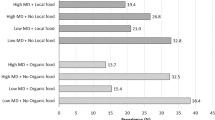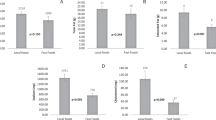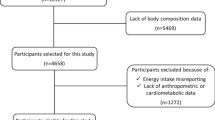Abstract
Mediterranean diet is definitely one of the healthiest dietary models. Next questions are: is the traditional Mediterranean diet adapted to the modern environmental and existential conditions? Could and/or should it be “modernized” to adapt to the various geographical, environmental, ethnic, and religious characteristics? If “modernization” is required, which traditional Mediterranean foods should be imperatively conserved as they are? Alternatively, which “new” foods—not traditional or not Mediterranean—could be introduced to help people to still respect the basic healthy Mediterranean diet principles? The present article intends to help solving these new questions.
This is a preview of subscription content, access via your institution
Access options
Subscribe to this journal
Receive 12 print issues and online access
$259.00 per year
only $21.58 per issue
Buy this article
- Purchase on Springer Link
- Instant access to full article PDF
Prices may be subject to local taxes which are calculated during checkout
Similar content being viewed by others
References
Mozaffarian D, Benjamin EJ, Blaha MJ, Chiuve SE, Cushman M, Das SR, et al.; American Heart Association Statistics Committee and Stroke Statistics Subcommittee. Heart Disease and Stroke Statistics-2017 Update: a report from the American Heart Association. Circulation. 2017;135:e146–603. Erratum in: Circulation. 2017;135:e646.
World Health Organization. In: World Health Statistics 2016: Monitoring health for the SDGs. 2016. http://www.who.int/gho/publications/world_health_statistics/2016/en/. Accessed 6 Apr 2017.
Trichopoulou A, Martínez-González MA, Tong TY, Forouhi NG, Khandelwal S, Prabhakaran D, et al. Definitions and potential health benefits of the Mediterranean diet: views from experts around the world. BMC Med. 2014;12:112.
de Lorgeril M. Mediterranean diet and cardiovascular disease: historical perspective and latest evidence. Curr Atheroscler Rep. 2013;15:370.
Estruch R, Ros E, Salas-Salvadó J, Covas MI, Corella D, Arós F, et al. PREDIMED Study Investigators. Primary prevention of cardiovascular disease with a Mediterranean diet. N Engl J Med. 2013;368:1279–90.
de Lorgeril M, Renaud S, Mamelle N, Salen P, Martin JL, Monjaud I, et al. Mediterranean alpha-linolenic acid-rich diet in secondary prevention of coronary heart disease. Lancet. 1994;343:1454–9. Erratum in: Lancet. 1995;345:738.
de Lorgeril M, Salen P, Martin JL, Monjaud I, Delaye J, Mamelle N. Mediterranean diet, traditional risk factors, and the rate of cardiovascular complications after myocardial infarction: final report of the Lyon Diet Heart Study. Circulation. 1999;99:779–85.
de Lorgeril M, Salen P, Martin JL, Monjaud I, Boucher P, Mamelle N. Mediterranean dietary pattern in a randomized trial: prolonged survival and possible reduced cancer rate. Arch Intern Med. 1998;158:1181–7.
Barak Y, Fridman D. Impact of Mediterranean Diet on cancer: focused literature review. Cancer Genomics Proteomics. 2017;14:403–8.
Berrino F. Mediterranean Diet and its association with reduced invasive breast cancer risk. JAMA Oncol. 2016;2:535–6.
Schwingshackl L, Hoffmann G. Does a Mediterranean-type diet reduce cancer risk? Curr Nutr Rep. 2016;5:9–17.
Rosato V, Guercio V, Bosetti C, Negri E, Serraino D, Giacosa A, et al. Mediterranean diet and colorectal cancer risk: a pooled analysis of three Italian case-control studies. Br J Cancer. 2016;115:862–5.
Giraldi L, Panic N, Cadoni G, Boccia S, Leoncini E. Association between Mediterranean diet and head and neck cancer: results of a large case-control study in Italy. Eur J Cancer Prev. 2016;26:418–23.
Bifulco M. How does the Mediterranean diet decrease the risk of a variety of cancers? Eur J Clin Nutr. 2015;69:1372.
Zeisel SH. Is there a new component of the Mediterranean diet that reduces inflammation? Am J Clin Nutr. 2008;87:277–8.
Matsumoto Y, Sugioka Y, Tada M, Okano T, Mamoto K, Inui K, et al. Monounsaturated fatty acids might be key factors in the Mediterranean diet that suppress rheumatoid arthritis disease activity: the TOMORROW study. Clin Nutr. 2017;37:675–80.
Godos J, Zappalà G, Bernardini S, Giambini I, Bes-Rastrollo M, Martinez-Gonzalez M. Adherence to the Mediterranean diet is inversely associated with metabolic syndrome occurrence: a meta-analysis of observational studies. Int J Food Sci Nutr. 2017;68:138–48.
Esposito K, Maiorino MI, Bellastella G, Panagiotakos DB, Giugliano D. Mediterranean diet for type 2 diabetes: cardiometabolic benefits. Endocrine. 2017;56:27–32.
Rienks J, Dobson AJ, Mishra GD. Mediterranean dietary pattern and prevalence and incidence of depressive symptoms in mid-aged women: results from a large community-based prospective study. Eur J Clin Nutr. 2013;67:75–82.
Jacka FN, O’Neil A, Opie R, Itsiopoulos C, Cotton S, Mohebbi M, et al. A randomised controlled trial of dietary improvement for adults with major depression (the ‘SMILES’ trial). BMC Med. 2017;15:23.
Veronese N, Stubbs B, Noale M, Solmi M, Luchini C, Maggi S. Adherence to the Mediterranean diet is associated with better quality of life: data from the Osteoarthritis Initiative. Am J Clin Nutr. 2016;104:1403–9.
Petersson SD, Philippou E. Mediterranean diet, cognitive function, and dementia: a systematic review of the evidence. Adv Nutr. 2016;7:889–904.
Zelber-Sagi S, Salomone F, Mlynarsky L. The Mediterranean dietary pattern as the diet of choice for NAFLD; evidence and plausible mechanisms. Liver Int. 2017;37:936–49.
Schwingshackl L, Hoffmann G. Monounsaturated fatty acids and risk of cardiovascular disease: synopsis of the evidence available from systematic reviews and meta-analyses. Nutrients. 2012;4:1989–2007.
Jakobsen MU, O’Reilly EJ, Heitmann BL, Pereira MA, Bälter K, Fraser GE, et al. Major types of dietary fat and risk of coronary heart disease: a pooled analysis of 11 cohort studies. Am J Clin Nutr. 2009;89:1425–32.
Gebauer SK, Destaillats F, Dionisi F, Krauss RM, Baer DJ. Vaccenic acid and trans fatty acid isomers from partially hydrogenated oil both adversely affect LDL cholesterol: a double-blind, randomized controlled trial. Am J Clin Nutr. 2015;102:1339–46.
Gebauer SK, Chardigny JM, Jakobsen MU, Lamarche B, Lock AL, Proctor SD, et al. Effects of ruminant trans fatty acids on cardiovascular disease and cancer: a comprehensive review of epidemiological, clinical, and mechanistic studies. Adv Nutr. 2011;2:332–54.
Jakobsen MU, Overvad K, Dyerberg J, Heitmann BL. Intake of ruminant trans fatty acids and risk of coronary heart disease. Int J Epidemiol. 2008;37:173–82.
Tong X, Chen GC, Zhang Z, Wei YL, Qin LQ. Cheese consumption and risk of all-cause mortality: a metaanalysis of prospective studies. Nutrients. 2017;9.
Guo J, Astrup A, Lovegrove JA, Gijsbers L, Givens DI. Milk and dairy consumption and risk of cardiovascular diseases and all-cause mortality: dose-response meta-analysis of prospective cohort studies. Eur J Epidemiol. 2017;32:269–87.
Hauswirth CB, Scheeder MR, Beer JH. High omega-3 fatty acid content in alpine cheese: the basis for an alpine paradox. Circulation. 2004;109:103–7.
Siscovick DS, Barringer TA, Fretts AM, Wu JH, Lichtenstein AH, Costello RB, et al. Omega-3 polyunsaturated fatty acid (fish oil) supplementation and the prevention of clinical cardiovascular disease: a Science Advisory From the American Heart Association. Circulation. 2017;135:e867–84.
Del Gobbo LC, Imamura F, Aslibekyan S, Marklund M, Virtanen JK, Wennberg M, et al. Cohorts for Heart and Aging Research in Genomic Epidemiology (CHARGE) Fatty Acids and Outcomes Research Consortium (FORCe). ω-3 Polyunsaturated Fatty Acid Biomarkers and Coronary Heart Disease: Pooling Project of 19 Cohort Studies. JAMA Intern Med. 2016;176:1155–66.
Amiano P, Chamosa S, Etxezarreta N, Arriola L, Moreno-Iribas C, Huerta JM, et al. No association between fish consumption and risk of stroke in the Spanish cohort of the European Prospective Investigation into Cancer and Nutrition (EPIC-Spain): a 13.8-year follow-up study. Public Health Nutr. 2016;19:674–81.
Kühn T, Teucher B, Kaaks R, Boeing H, Weikert C, Buijsse B. Fish consumption and the risk of myocardial infarction and stroke in the German arm of the European Prospective Investigation into Cancer and Nutrition (EPIC-Germany). Br J Nutr. 2013;110:1118–25.
de Goede J, Geleijnse JM, Boer JM, Kromhout D, Verschuren WM. Marine (n-3) fatty acids, fish consumption, and the 10-year risk of fatal and nonfatal coronary heart disease in a large population of Dutch adults with low fish intake. J Nutr. 2010;140:1023–8.
Iso H, Kobayashi M, Ishihara J, Sasaki S, Okada K, Kita Y, et al. Intake of fish and n3 fatty acids and risk of coronary heart disease among Japanese: the Japan Public Health Center-Based (JPHC) Study Cohort I. Circulation. 2006;113:195–202.
Cusack LK, Smit E, Kile ML, Harding AK. Regional and temporal trends in blood mercury concentrations and fish consumption in women of child bearing Age in the united states using NHANES data from 1999-2010. Environ Health. 2017;16:10.
Wallin A, Orsini N, Forouhi NG, Wolk A. Fish consumption in relation to myocardial infarction, stroke and mortality among women and men with type 2 diabetes: a prospective cohort study. Clin Nutr. 2017;37:590–6.
Huang RX, Duan YY, Hu JA. Fish intake and risk of liver cancer: a meta-analysis. PLoS ONE. 2015;10:e0096102.
Yu XF, Zou J, Dong J. Fish consumption and risk of gastrointestinal cancers: a meta-analysis of cohort studies. World J Gastroenterol. 2014;20:15398–412.
Lian W, Wang R, Xing B, Yao Y. Fish intake and the risk of brain tumor: a meta-analysis with systematic review. Nutr J. 2017;16:1.
Yassine HN, Feng Q, Azizkhanian I, Rawat V, Castor K, Fonteh AN, et al. Association of serum docosahexaenoic acid with cerebral amyloidosis. JAMA Neurol. 2016;73:1208–16.
Dawczynski C, Dittrich M, Neumann T, Goetze K, Welzel A, Oelzner P, et al. Docosahexaenoic acid in the treatment of rheumatoid arthritis: a double-blind, placebo-controlled, randomized cross-over study with microalgae vs. sunflower oil. Clin Nutr. 2017;37:494–504.
de Lorgeril M. Mediterranean diet in the prevention of coronary heart disease. Nutrition. 1998;14:55–7.
Simopoulos AP. The Mediterranean diets: What is so special about the diet of Greece? The scientific evidence. J Nutr. 2001;131Suppl 11:3065S–73S.
Zeghichi S, Kallithraka S, Simopoulos AP, Kypriotakis Z. Nutritional composition of selected wild plants in the diet of Crete. World Rev Nutr Diet. 2003;91:22–40.
Simopoulos AP, Norman HA, Gillaspy JE, Duke JA. Common purslane: a source of omega-3 fatty acids and antioxidants. J Am Coll Nutr. 1992;11:374–82.
Fleming JA, Kris-Etherton PM. The evidence for α-linolenic acid and cardiovascular disease benefits: comparisons with eicosapentaenoic acid and docosahexaenoic acid. Adv Nutr. 2014;5:863S–76S.
Hu FB, Stampfer MJ, Manson JE, Rimm EB, Wolk A, Colditz GA, et al. Dietary intake of alpha-linolenic acid and risk of fatal ischemic heart disease among women. Am J Clin Nutr. 1999;69:890–7.
Yamagishi K, Ikeda A, Chei CL, Noda H, Umesawa M, Cui R, et al; CIRCS Investigators. Serum α-linolenic and other ω-3 fatty acids, and risk of disabling dementia: community-based nested case-control study. Clin Nutr. 2016;36:793–7.
de Lorgeril M, Salen P, Martin J-L, et al. Interactions of wine drinking with omega-3 fatty acids in patients with coronary heart disease: a fish-like effect of moderate wine drinking. Am Heart J. 2008;155:175–81.
di Giuseppe R, de Lorgeril M, Salen P, et al. Alcohol consumption and n-3 polyunsaturated fatty acids in healthy men and women from 3 European populations. Am J Clin Nutr. 2009;89:354–62.
Toufektsian M-C, Salen P, Laporte F, de Lorgeril M, et al. Dietary flavonoids increase plasma very long-chain (n-3) fatty acids in rats. J Nutr. 2011;141:37–41.
Burak C, Wolffram S, Zur B, Langguth P, Fimmers R, Alteheld B, et al. Effects of the flavonol quercetin and α-linolenic acid on n-3 PUFA status in metabolically healthy men and women: a randomised, double-blinded, placebo-controlled, crossover trial. Br J Nutr. 2017;117:698–711.
Vauzour D, Tejera N, O’Neill C, et al. Anthocyanins do not influence long-chain n-3 fatty acid status: studies in cells, rodents and humans. J Nutr Biochem. 2015;26:211–8.
Ounnas F, Privé F, Salen P, Gaci N, Tottey W, Calani L, et al. Whole rye consumption improves blood and liver n-3 fatty acid profile and gut microbiota composition in rats. PLoS ONE. 2016;11:e0148118.
Ounnas F, de Lorgeril M, Salen P, Laporte F, Calani L, Mena P, et al. Rye polyphenols and the metabolism of n-3 fatty acids in rats: a dose dependent fatty fish-like effect. Sci Rep. 2017;7:40162.
Nakatsu CH, Armstrong A, Clavijo AP, Martin BR, Barnes S, Weaver CM. Fecal bacterial community changes associated with isoflavone metabolites in postmenopausal women after soy bar consumption. PLoS ONE. 2014;9:e108924.
Hazim S, Curtis PJ, Schär MY, Ostertag LM, Kay CD, Minihane AM, et al. Acute benefits of the microbial-derived isoflavone metabolite equol on arterial stiffness in men prospectively recruited according to equol producer phenotype: a double-blind randomized controlled trial. Am J Clin Nutr. 2016;103:694–702.
Setchell KD, Clerici C. Equol: history, chemistry, and formation. J Nutr. 2010;140:1355S–62S.
Li J, Zhao F, Wang Y, Chen J, Tao J, Tian G, et al. Gut microbiota dysbiosis contributes to the development of hypertension. Microbiome. 2017;5:14.
De Filippis F, Pellegrini N, Vannini L, Jeffery IB, La Storia A, Laghi L, et al. High-level adherence to a Mediterranean diet beneficially impacts the gut microbiota and associated metabolome. Gut. 2016;65:1812–21.
Haro C, Garcia-Carpintero S, Alcala-Diaz JF, Gomez-Delgado F, Delgado-Lista J, Perez-Martinez P, et al. The gut microbial community in metabolic syndrome patients is modified by diet. J Nutr Biochem. 2016;27:27–31.
Rosati A, Cafiero C, Paoletti A, Alfei B, Caporali S, Casciani L, et al. Effect of agronomical practices on carpology, fruit and oil composition, and oil sensory properties, in olive (Olea europaea L.). Food Chem. 2014;159:236–43.
West BJ, Uwaya A, Isami F, Deng S, Nakajima S, Jensen CJ. Antiglycation activity of iridoids and their food sources. Int J Food Sci. 2014;27:6950.
Navarro M, Morales FJ. Evaluation of an olive leaf extract as a natural source of antiglycative compounds. Food Res Int. 2017;92:56–63.
Mosele JI, Martín-Peláez S, Macià A, Farràs M, Valls RM, Catalán Ú, et al. Faecal microbial metabolism of olive oil phenolic compounds: in vitro and in vivo approaches. Mol Nutr Food Res. 2014;58:1809–19.
Zampa A, Silvi S, Servili M, Montedoro G, Orpianesi C, Cresci A. In vitro modulatory effects of colonic microflora by olive oil iridoids. Microb Ecol Health Dis. 2006;18:147–53.
Bozzetto L, Alderisio A, Giorgini M, Barone F, Giacco A, Riccardi G, et al. Extra-virgin olive oil reduces glycemic response to a high-glycemic index meal in patients with type 1 diabetes: a randomized controlled trial. Diabetes Care. 2016;39:518–24.
de Lorgeril M, Salen P, Martin JL, Boucher F, Paillard F, de Leiris J. Wine drinking and risks of cardiovascular complications after recent acute myocardial infarction. Circulation. 2002;106:1465–9.
Schröder H, Masabeu A, Marti MJ, Cols M, Lisbona JM, Romagosa C, et al.; REGICOR investigators. Myocardial infarction and alcohol consumption: a population-based case-control study. Nutr Metab Cardiovasc Dis. 2007;17:609–15.
Costanzo S, Di Castelnuovo A, Donati MB, Iacoviello L, de Gaetano G. Wine, beer or spirit drinking in relation to fatal and non-fatal cardiovascular events: a meta-analysis. Eur J Epidemiol. 2011;26:833–50.
Fagherazzi G, Vilier A, Boutron-Ruault MC, Mesrine S, Clavel-Chapelon F. Alcohol consumption and breast cancer risk subtypes in the E3N-EPIC cohort. Eur J Cancer Prev. 2015;24:209–14.
Funding
This article is published as part of a supplement sponsored by the Mediterranean Diet Foundation and the Diputació de Barcelona.
Author information
Authors and Affiliations
Corresponding author
Ethics declarations
Conflict of interest
MdL received fees as a regular member of the Scientific Advisory Board of the Barilla Company (Italy). The remaining authors declare that thay have no conflict of interest.
Rights and permissions
About this article
Cite this article
de Lorgeril, M., Salen, P. & Rabaeus, M. New and traditional foods in a modernized Mediterranean diet model. Eur J Clin Nutr 72 (Suppl 1), 47–54 (2019). https://doi.org/10.1038/s41430-018-0308-6
Published:
Issue Date:
DOI: https://doi.org/10.1038/s41430-018-0308-6



